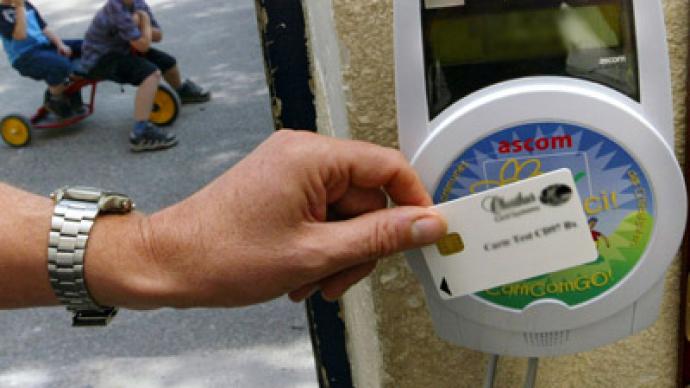Texas schools punish students who refuse to be tracked with microchips

A school district in Texas came under fire earlier this year when it announced that it would require students to wear microchip-embedded ID cards at all times. Now, students who refuse to be monitored say they are feeling the repercussions.
Since October 1, students at John Jay High School and Anson Jones Middle School in San Antonio, Texas, have been asked to attend class with photo ID cards equipped with radio-frequency identification (RFID) chips to track every pupil’s location. Educators insist that the endeavor is being rolled out in Texas to stem the rampant truancy devastating the school's funding. If the program is judged successful, the RFID chips could soon come to 112 schools in all and affect nearly 100,000 students. Students who refuse to walk the school halls with the card in their pocket or around their neck claim they are being tormented by instructors, and are barred from participating in certain school functions. Some also said they were turned away from common areas like cafeterias and libraries.Andrea Hernandez, a sophomore at John Jay, said educators have ignored her pleas to respect her privacy and told her she cannot participate in school elections if she refuses to comply with the tracking program.Hernandez said in an interview with Salon that subjecting herself to constant monitoring through an RFID chip is like being branded with the “mark of the beast” – a reference to the Bible's apocalyptic Book of Revelations. When she reached out to WND with the school’s response, though, she said that she was threatened with not being allowed to vote for her school's homecoming king and queen for disobeying the student ID rule."I had a teacher tell me I would not be allowed to vote because I did not have the proper voter ID," Hernandez told WND. "I had my old student ID card which they originally told us would be good for the entire four years we were in school. He said I needed the new ID with the chip in order to vote."After Hernandez refused to wear an RFID chip, WND reported that Deputy Superintendent Ray Galindo issued a statement to the girl's parents: “We are simply asking your daughter to wear an ID badge as every other student and adult on the Jay campus is asked to do.” If she is allowed to forego the tracking now, the repercussions will be harsher than just revoking voting rights for homecoming contests once the school makes location-monitoring mandatory, he argued.“I urge you to accept this solution so that your child’s instructional program will not be affected. As we discussed, there will be consequences for refusal to wear an ID card as we begin to move forward with full implementation,” Galindo wrote.The girl’s father, Steve Hernandez, told WND that the school was somewhat willing to work with his daughter, but said that the family is unwilling to “agree to stop criticizing the program” and publically endorse it.“I told him that was unacceptable because it would imply an endorsement of the district’s policy and my daughter and I should not have to give up our constitutional rights to speak out against a program that we feel is wrong,” Mr. Hernandez responded.The Northside Independent School District expects to collect upwards of $2 million in state funding by reversing its poor attendance figures, with the RFID program costing around one-quarter of that sum to initiate and another $136,005 in maintenance. The new funding may not offset the other damages that could arise: Heather Fazio of Texans for Accountable Government told WND that she filed a Freedom of Information Act request for $30 and received the names and addresses of every student in the school district.“Using this information along with an RFID reader means a predator could use this information to determine if the student is at home and then track them wherever they go. These chips are always broadcasting so anyone with a reader can track them anywhere,” she said.Kirsten Bokenkamp of the ACLU told the San Antonio Express-News earlier this year that her organization expected to challenge the board’s decision to use the tracking system, but the school went ahead with the program undeterred. Steve Hernandez told WND that he approached the ACLU abour representing his daughter’s case, but Rebecca Robertson of a local branch of the organization said that, “the ACLU of Texas will not be able to represent you or your daughter in this matter,” saying the case did not meet the group's criteria.













